Explanation
In this module you will face questions from 6 different scenarios that you will find yourself in while dealing.
Scenario 1
Tournament Chip Counting
You will be shown a chip stack that would emulate a player's chip stack in a tournament and you must correctly count it.
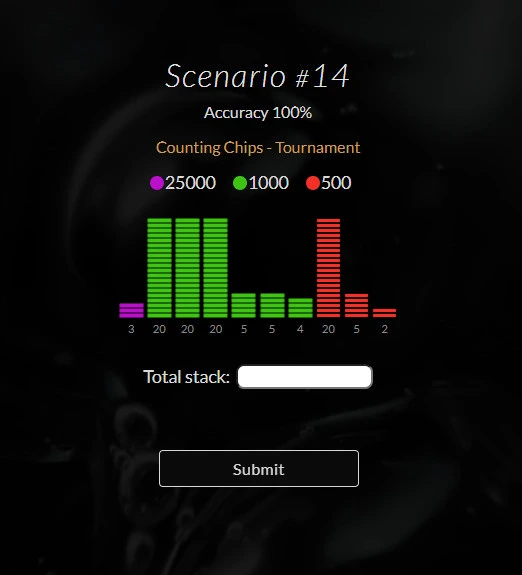
There will be a different amount of chips used each time along with a variety of denominations. You will always be given the denominations of the chip values that are in use at the top of the scenario.
Each chip denomination is broken down into stacks of 20, then 5's with the remainder of chips being shown on the side.
Available Chip Pool
- 100
- 500
- 1000
- 5000
- 25000
Scenario 2
Cash Game Chip Counting
You will be shown a chip stack that would emulate a player's chip stack in a cash game and you must correctly count it.
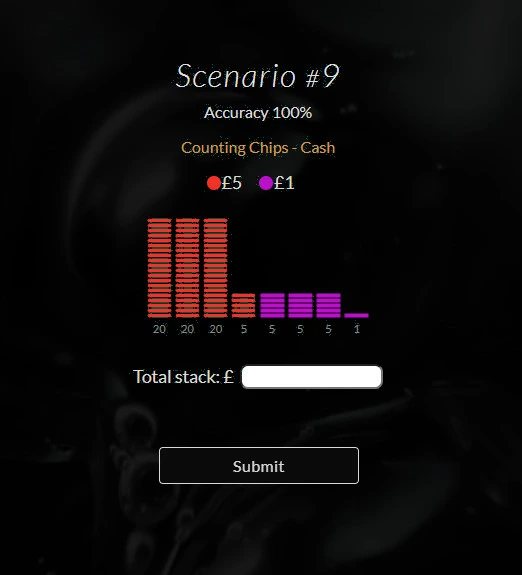
There will be a different amount of chips used each time along with a variety of denominations. You will always be given the denominations of the chip values that are in use at the top of the scenario.
Each chip denomination is broken down into stacks of 20, then 5's with the remainder of chips being shown on the side.
Available Chip Pool
- £1
- £5
- £25
- £100
Scenario 3
Pot Calculating
You will be given a series of actions and you must correctly determine how much of the pot can be raked.
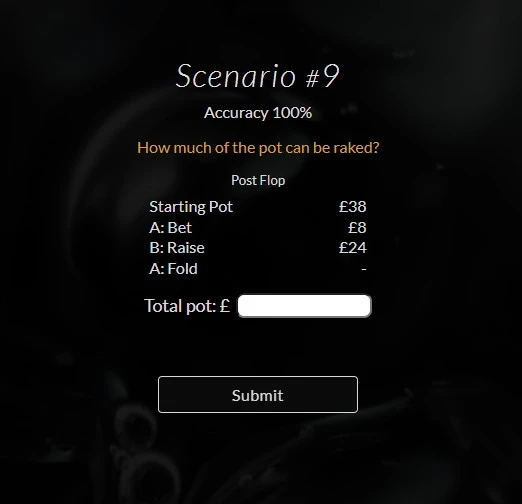
When a hand finishes you must know how to work out how much of the pot can be raked. This calculation is found by summing the total amount of all called bets.
If the hand completes as a result of an action that finishes with a Bet-Raise-Fold sequence the 'rakeable' pot may be larger than you realise.
In the example above the total pot amount will be
£38 + £8 + £8 = £54
The player that raises has called the £8 and raised an additional £16. This means that the called £8 gets included in the total pot.
There is no rake pre-flop.
Scenario 4
Min Raises
You will need to work out the minimum amount the next player can raise given a series of actions.
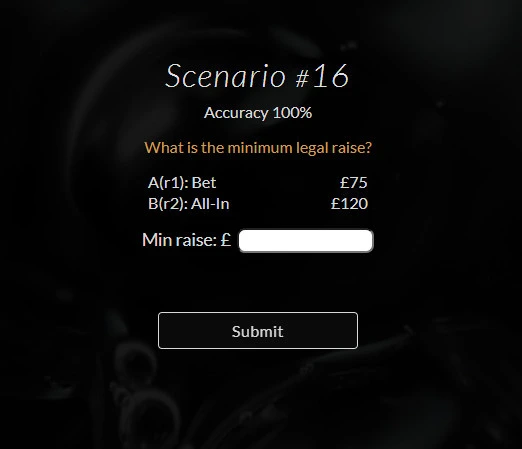
It is not always double the last bet
To work out the amount of a minumum raise you must first find the difference between the latest action and the action taken previous to that. After you have found that value you should add it to the latest action.
If Player A bets £5 and player B raises to £11 then if player C wants to raise it must be at least £17.
(£11 - £5) + £11 = £17
Call with extra
There may come a time when a player moves All-in and the amount of the All-in does not constitute a minimum raise. This means that not only is the betting not re-opened by this action but the way you calculate the next minimum raise has also changed. This action is known as "Call with extra".
To correctly calculate the minimum raise value you must first calculate the legal minimum raise against the action that comes before the All-in. In the example above this would be against the £75 bet.
(£75 - £0) + £75 = £150
As there is no action that comes before the £75 bet the minimum bet will be twice the size. Once we know the legal minimum raise against the previous action we can proceed with the second part of the equation, the "Extra" part.
We find the extra by working out the difference between the bet and the All-in and then finally we add the extra to the minimum raise that we worked out earlier to find out the actual legal minimum raise that the next player can raise.
(£120 - £75) + £150 = £195
Scenario 5
Side Pots
You will need to work out how much is in either the main pot or the side pot given a series of actions.
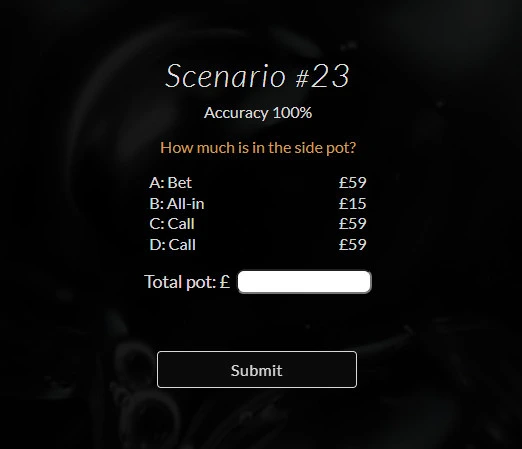
Sometimes you will need to work out a side pot. This occurs when a player(s) does not have enough chips to cover any bet.
When this occurs all active players match the smallest stack, all of these chips along with any current pot accumulate to create the "Main Pot". The amount of the next smallest stack is then matched by all and this will create a "Side Pot", this process will continue until all stacks are matched.
A pot can only be won by a player who has contributed chips to that pot.
In the example above the main pot will be £60, £15 will be contributed to it by all of the players.
The side pot is the remainder, in this case
(£59 - £15) * 3 = £132
All players are eligible to win the main pot, as they all contributed, but only players A, C and D are able to win the side pot.
Scenario 6
Call or Raise
You will need to decide whether the action descibed is a call or a raise given a series or actions. You will have to work out how much the player has to pay.
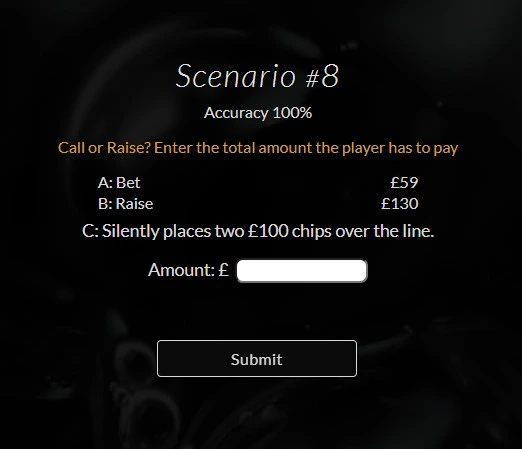
"Chips speak"
Poker is game that should be able to be played without any player needing to speak, therefore there are rules that lend themselves towards the ability to do that.
When a player makes an action silently that action must be worked out by the dealer unambiguously, to make sure you know what to do you should follow these two rules;
- #1: One single chip is always only a call
- #2: Two chips of the same denomination is always a call, if, one of the chips does not cover the bet
Given the example above rule #2 comes into play because a single £100 chip does not cover the £130 bet, even though £200 would be a legal raise.